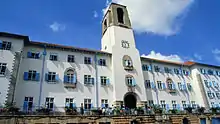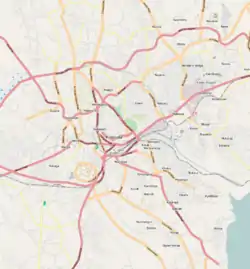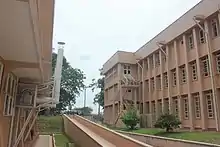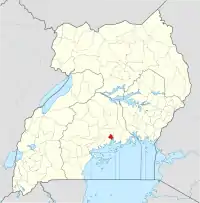Makerere University
Makerere University, Kampala (/məˈkɛrəri/ ;[6] Mak) is Uganda's largest and oldest institution of higher learning, first established as a technical school in 1922. It became an independent national university in 1970. Today, Makerere University is composed of nine colleges and one school offering programmes for about 36,000 undergraduates and 4,000 postgraduate.The main administrative block recently was gutted by fire in September of 2020 and the cause of the fire is yet to be established
 The Main Administration block for Makerere University, normally called the Main Building | |
| Motto | We build for the future |
|---|---|
| Type | Public |
| Established | 1922 |
| Chancellor | Ezra Suruma[1] |
| Vice-Chancellor | Barnabas Nawangwe[2][3] |
Administrative staff | 3,174 (2018)[4] |
| Students | 35,000+ (2018)[5] |
| Location | , 00°20′06″N 32°34′03″E |
| Campus | Urban |
| Website | www.mak.ac.ug |
 Location in Kampala | |
U.S. News & World Report has ranked Makerere University as the eighth best university in Africa and the 569th best university worldwide.[7] In the 2020 U.S. News & World Report ranking, Makerere is the highest-ranked university in sub-Saharan Africa outside of South Africa.[8] The Times Higher Education World University Rankings for 2016 ranked it as the fourth best university in Africa.[9]
Makerere University was alma mater to many post-independence African leaders, including Ugandan president Milton Obote and Tanzanian presidents Julius Nyerere and Benjamin Mkapa. The former president of the Democratic Republic of the Congo, Joseph Kabila, and Kenyan president Mwai Kibaki are also Makerere alumni.
In the years immediately after Uganda's independence, Makerere University was a focal point for the literary activity that was central to African nationalist culture. Many prominent writers, including Nuruddin Farah, Ali Mazrui, David Rubadiri, Okello Oculi, Ngũgĩ wa Thiong'o, John Ruganda, Paul Theroux, Nobel Prize laureate V. S. Naipaul, and Peter Nazareth, were at Makerere University at one point in their writing and academic careers.
Because of student unrest and faculty disenchantment, the university was closed three times between 2006 and 2016. The final time was on 1 November 2016 when President Yoweri Museveni declared it closed indefinitely.[10] The university was reopened in January 2017.[11]
History
Founding of the technical school
The trade school that became Makerere University began operating in 1921 with the first classes in carpentry, building construction and mechanics.[12] In 1922 it was founded as the "Uganda Technical College" with additional courses in the arts, education, agriculture and medicine.[12][13] That same year it was again renamed as Makerere College.[12] In 1928, the vocational classes were separated from the college and renamed Kampala Technical School.[12] In 1937 the college began offering post-secondary education certificate courses.[13]
University
In 1943, the British Protectorate government proposed the university, which led to a controversial struggle. It was described as "a plot to steal African soil for European settlement," by the Bataka Party. In response to this campaign, there was rioting in the capital of Kampala.[14]

In 1949 Makerere College was granted university status and its name became Makerere College, University of East Africa.[15] In the same year, the Bataka Party had been banned by the British Protectorate government, because of acts of riot and arson committed after a Bataka protest gathering.[16]
.jpg.webp)
Unrest in the 2000s
The university was closed three times between 2006 and 2016.[17]
Beginning on 1 August 2016, the non-teaching staff went on strike demanding their back pay. The strike lasted three weeks and the government agreed to pay them by the end of October; however, the government failed to do so.[18] This was but one more broken promise in the cycle of failed promises, strikes and more promises.[17] That strike was followed by a strike of the lecturers over unpaid incentive pay, and that strike was joined by students in solidarity. This led to President Yoweri Museveni closing the university "indefinitely".[17] Additional protests, including from parents whose children were left hanging in mid-semester, led to Museveni appointing a special commission to try to rectify the situation but with no promises of reopening. The commission's report is due in late February 2017.[10]
On the 20th of September, 2020, the main building of Makerere University ( the Ivory Tower) was burnt up in flames[19] allegedly following a probe by Uganda Parliament into a 26 Billion embezzlement by university authorities.
Organization
The University Council is the supreme governing body of the university while Senate is the chief academic organ of the University.
Academic units
Colleges
- College of Agricultural and Environmental Sciences
- College of Business and Management Sciences
- College of Computing & Information Sciences
- College of Education and External Studies
- College of Engineering, Design, Art and Technology
- College of Health Sciences
- College of Humanities and Social Sciences
- College of Natural Sciences
- College of Veterinary Medicine, Animal resources and BioSecurity
Affiliated institutions
- Alokolum Seminary
- Katigondo Seminary
- Ggaba Seminary
- Kinyamasika Seminary
- Mbale School Clinical Officers
- Mbale School Hygiene
- Mulago Paramedical Schools
- Kampala University
Notable former and current faculty administrators
- Barnabas Nawangwe, architect, academic and current Vice Chancellor[28][29]
- John Ddumba Ssentamu, economist, academic and banker, former Vice Chancellor
- Venansius Baryamureeba, computer scientist, former Vice Chancellor
- Hugh Dinwiddy, lecturer in literature, warden of Northcote Hall
- George Kirya, microbiologist, diplomat, academic, former Vice Chancellor at Makerere and former Chairman of Uganda Health Services Commission
- Mahmood Mamdani, political scientist and historian
- Ali Mazrui, academic, historian and political scientist
- Apolo Nsibambi, former Prime Minister of Uganda and former Chancellor of Makerere University
- Joe Oloka-Onyango, former Dean of Law and human rights expert
- Okot p'Bitek, poet
- John Ssebuwufu, a renowned chemist, former Vice Chancellor of Makerere University, current Chancellor of Kyambogo University
- David Serwadda, former dean, School of Public Health
- Nelson Sewankambo, principal, College of Health Sciences
- Harriet Mayanja-Kizza, current Dean of Students, Makerere University School of Medicine
- Sylvia Tamale, lawyer, academic, women's rights activist
- Ngũgĩ wa Thiong'o, novelist[30]
- Timothy Wangusa, author, poet, one time minister of education
- David Wasawo, zoologist and educationist, former vice principal
- John L. Ziegler, former Director of Uganda Cancer Institute, current Professor in Residence Emeritus at UCSF[31]
- William Bazeyo, former Dean of Makerere University School of Public Health (2009–2017). Deputy Vice Chancellor of Makerere University, responsible for Finance and Administration, since September 2017.[32]
Other academics
- Hakim Sendagire - Physician, biochemist and microbiologist. Current Dean of Habib Medical School
- Charles Olweny - Physician, oncologist, medical researcher. Former Vice Chancellor of Uganda Martyrs University
- Paul D'Arbela - Physician, cardiologist, academic. Dean of the Mother Kevin Postgraduate Medical School, Nsambya.
- Celestino Obua - Physician, pharmacologist, academic. Current Vice Chancellor of Mbarara University.
- Gavamukulya Yahaya - Biochemist and Molecular Biologist. Lecturer at Busitema University Medical School and Secretary General Pan African University Alumni Association.
Notable alumni
Political figures and government employees
- Lucy Akello, Ugandan politician, who serves as the elected member of parliament for the Amuru District Women's Constituency, in the 10th Parliament.
- Samuel Awich (1973), justice of the Supreme Court of Belize[33]
- Kizza Besigye, physician, retired colonel in the Uganda People's Defence Force. Opposition politician, former leader of the Forum for Democratic Change party, presidential candidate in 2001, 2006, and 2011.
- Godfrey Binaisa, former president of Uganda
- Gilbert Bukenya, former vice-president of Uganda
- Kanyama Chiume, a Malawian who worked for the independence of Nyasaland (now Malawi)
- Moses Ebuk, physician, neurophyiologist, former lecturer and tutor in the department of physiology at the Makerere University College of Health Sciences, diplomat. Ambassador of Uganda to the Russian Federation.
- Daphrosa Gahakwa, Rwandan education minister
- Aloisea Inyumba, Rwandan minister for gender and family promotion
- Joseph Kabila, Congolese politician and president of the Democratic Republic of the Congo
- Allen Kagina, Public Administrator
- Filemona F. Indire former Kenyan ambassador, leading educator and member of parliament.
- Patrick Karegeya, former Rwandan head of intelligence
- Andrew Felix Kaweesi, Assistant Inspector General of Police (AIGP) Uganda, a military officer and policeman. He was the Spokesperson of Uganda Police Force from August 2016 to 2017.
- Specioza Kazibwe, former vice-president of Uganda
- Mwai Kibaki, the third president of Kenya from December 2002 until April 2013. Graduated at the top of his class (summa cum laude) in 1955 with a bachelor of arts in economics.[34]
- Samson Kisekka, former vice-president of Uganda
- Benedicto Kiwanuka, first prime minister and first chief justice of Uganda
- Crispus Kiyonga, physician, minister of defense of Uganda
- Sam Kutesa, Uganda's foreign affairs minister. President of the sixty-ninth session of the United Nations General Assembly
- Henry Kyemba, minister of health under Idi Amin[35]
- Catherine Kyobutungi, Director of the
- Yusuf Lule, former president of Uganda
- Fagil Mandy, Former Chairman of UNEB (2012-2015), actor
- Norbert Mao, former Guild President of Makerere University and current President of Democratic Party
- Amama Mbabazi, former secretary general of the National Resistance Movement and former prime minister of Uganda
- Benjamin Mkapa, Tanzanian politician and former president of Tanzania
- Jennifer Musisi, Lawyer and Public Administrator
- Jehoash Mayanja Nkangi, government minister and former Katikkiro of Buganda (1964–1966, 1993–1994)[36]
- Apolo Nsibambi, former prime minister of Uganda and former chancellor of Makerere University
- Julius Nyerere, Tanzanian politician and the first president of Tanzania
- Anthony Ochaya, Ugandan Minister of Planning and Economic Development under the UNLF regime, World Bank official
- Oginga Odinga, Kenyan politician and the first vice president of Kenya
- Milton Obote, two-time former president of Uganda
- Ruhakana Rugunda, prime minister of Uganda, physician, and former permanent representative of Uganda to the United Nations
- Emmanuel Tumusiime-Mutebile, governor, Bank of Uganda
- Emmanuel Balayo Wakhweya, Minister of Finance under Idi Amin
- Bobi Wine, (Robert Kyagulanyi Ssentamu), Ugandan politician, businessman, entrepreneur, philanthropist, musician, freedom fighter and actor
Film, Television and Radio
- Cleopatra Koheirwe, Ugandan actress, singer and media personality
- Alex Muhangi, Ugandan Comedian and actor
- Housen Mushema, Ugandan actor and model
- Rehema Nanfuka, Ugandan Actress, director and producer
- Crystal Newman, Ugandan media personality, MC and motivational speaker.
- Gladys Oyenbot, Ugandan actress and producer
- Edwin Musiime, television host
Sportspeople
- Henry Osinde – Ugandan born Cricketer currently Canadian fast bowler.
- Moses Muhangi - President of Uganda Boxing Federation
Writers and journalists
- Christopher Henry Muwanga Barlow
- Jane Kaberuka, novelist
- Daniel Kalinaki, journalist
- Micere Githae Mugo Kenyan novelist, poet, activist
- John Nagenda, writer, political commentator and adviser to the president of Uganda, Yoweri Museveni
- Peter Nazareth, author, critic
- Michael Nsimbi, "Father of Ganda literature"
- Okello Oculi, author, poet
- Charles Onyango-Obbo, journalist and political commentator
- Mark Ouma, athletics journalist and former philosophy lecturer at Makerere
- David Rubadiri, poet, novelist, diplomat
- Ngũgĩ wa Thiong'o, Kenyan novelist
- Hilda Twongyeirwe, editor, poet, shortstory writer
- Timothy Wangusa, author, poet, one-time minister of education
- Elvania Namukwaya Zirimu, poet and dramatist
Scientists
- Robert Kezaala, physician, Senior Health Advisor at UNICEF
- Matthew Lukwiya, physician in Gulu during the 2000 Ebola outbreak
- Kihembo Moses, Wildlife Biologist and Environmentalist
- Etheldreda Nakimuli-Mpungu, psychiatrist and epidemiologist
- Edward Otim Ojuka, Associate Professor at University of Cape Town. Researcher in exercise Physiology and Diabetology.
Others
- Iddah Asin, lawyer and Johnson & Johnson executive [37]
- Emmanuel Khabusi Kamuli, Education Specialist, UNICEF; former Chairman, Mitchell Hall; author
- Anne Kansiime, comedian
- Laeticia Kikonyogo, lawyer and judge
- Patrick Mazimhaka, deputy chairperson of the African Union's African Commission
- Andrew Mwenda, the managing director of the "Independent" Newspaper in Uganda
- Kato Mukasa, co-founder of the Humanist Association for Leadership, Equity and Accountability
- Lilian Mary Nabulime, sculptor
- Harry Nkumbula, a leader during Zambia's struggle for independence
- Olara Otunnu, former United Nations under-secretary general and special representative for children and armed conflict
- Manuela Pacutho, educator, businesswoman and CEO of The Cradle
- John Sentamu, Anglican Archbishop of York, England, the first black Archbishop of the Church of England
- Martin Ssempa, controversial Ugandan pastor and AIDS activist
- Busingye Kabumba, poet, lawyer and lecturer at law.
- Maria Auma, climate activist
- Sadati Ali Musana, businessman and politician.
Halls of residence
As of September 2015, the halls of residence at Makerere University included the following:[38]
For men
- Livingstone Hall
- Lumumba Hall
- Mitchell Hall
- Nkrumah Hall
- Nsibirwa Hall
- University Hall
For women
- Africa Hall
- Mary Stuart Hall
- Complex Hall
For students of medicine in their final years
- Galloway House
Postgraduate Hall
- Dag Hammarskjöld
Upcountry campuses
In January 2010, the university announced the opening of two new campuses, one in the city of Fort Portal, approximately 310 kilometres (190 mi), by road, west of Kampala, and another one in the city of Jinja, approximately 85 kilometres (53 mi), by road, east of Kampala. The following courses will be offered at the upcountry campuses:[39]
Eastern Campus, Jinja
- Bachelor of Science in Computer Science
- Bachelor of Information Technology
- Bachelor of Development Studies
- Bachelor of Tourism
See also
References
- Ahimbisibwe, Patience (18 January 2016). "Dr. Suruma Installed Makerere Chancellor". Daily Monitor. Kampala. Retrieved 6 April 2018.
- Mukhaye, Damali (25 August 2017). "Prof Nawangwe confirmed Makerere University Vice Chancellor". Daily Monitor (Kampala). Retrieved 29 September 2017.
- Tuhereze, Elias (15 September 2017). "New Makerere University Vice Chancellor Professor Barnabas Nawangwe Installed". Ms Jane Anyango, Communication Officer and Ms Ritah Namisango, SPRO. Retrieved 29 September 2017.
- Mukhaye, Damali (1 January 2018). "Makerere probe discovers 16,000 ghost students". Daily Monitor. Kampala. Retrieved 1 January 2018.
- Wandera, Derrick (6 April 2018). "Makerere enrolment reduces by 15,000". Daily Monitor. Kampala. Retrieved 6 April 2018.
- Peter Roach, Jane Setter, John Esling, eds., Cambridge English Pronouncing Dictionary (Cambridge University Press, 2011; ISBN 0521765757), p. 302.
- Editor, Juliette Namakula | Assistant (2020-06-03). "FULL LIST: Makerere University now ranked eighth best in Africa". Education News Uganda. Retrieved 2020-06-30.CS1 maint: extra text: authors list (link)
- "Best Global Universities in Africa". U.S. News & World Report. Retrieved 11 August 2020.
- https://www.usnews.com/education/best-global-universities/africa
- "Statement: Makerere Visitation Committee lists responsibilities". Uganda Journalists' Resource Centre, The African Centre for Media Excellence (ACME). 22 November 2016. Archived from the original on 2 December 2016.
- "Makerere reopens to empty lecture rooms". New Vision. 2 January 2017. Archived from the original on 3 January 2017.
- Uganda. Public Service Review and Re-organization Commission (1990). Public Service Review and Reorganisation Commission, 1989-1990, Volume 1. Kampala, Uganda: Uganda. Ministry of Public Service and Cabinet Affairs. p. 272. OCLC 32432462.
- "Annotated History of Makerere University 1922–2012". 90 Years of Makerere University. Makerere University. Archived from the original on 11 September 2014.
- A. J. Hughes (1969). "Buganda Troubles in the 1940s". East Africa (Revised ed.). Pengiun Books. p. 157.
- Byaruhanga, Frederick K. (2013). Student Power in Africa's Higher Education: A Case of Makerere University (second ed.). New York: Taylor & Francis (Routledge). p. 20. ISBN 978-1-135-51448-8., originally published in 2006, ISBN 978-0-415-97746-3
- A. J. Hughes (1969). "Buganda Troubles in the 1940s". East Africa (Revised ed.). Pengiun Books. p. 158.
- Barungi. Andrew (21 November 2016). "Makerere University is closed. Now what?". Uganda Journalists' Resource Centre, The African Centre for Media Excellence (ACME). Archived from the original on 2 December 2016.
- Tusiime, Christopher (30 November 2016). "Non-teaching staff in public universities to go on strike". Campus Bee. Makerere University. Archived from the original on 2 December 2016.
- "Uganda Makerere University fire: 'Ivory Tower' gutted". BBC News. 2020-09-20. Retrieved 2020-09-21.
- "Makerere University Governance: Appointments Board". Archived from the original on 13 November 2010. Retrieved 30 January 2015.
- "Finance, Planning and Administration". Archived from the original on 15 November 2010. Retrieved 13 September 2012.
- "Quality Assurance, Gender and ICT Sub Committee". Archived from the original on 23 December 2012. Retrieved 13 September 2012.
- "Estates and Works". Retrieved 13 September 2012.
- "Staff Development, Welfare and Retirement Benefits". Archived from the original on 22 December 2012. Retrieved 13 September 2012.
- "Students Affairs and Disciplinary Sub Committee". Archived from the original on 23 December 2012. Retrieved 13 September 2012.
- "Honorary Awards Sub Committee". Archived from the original on 22 December 2012. Retrieved 13 September 2012.
- "Audit Sub Committee". Archived from the original on 23 December 2012. Retrieved 12 September 2012.
- "New Makerere University Vice Chancellor Professor Barnabas Nawangwe Installed". Makerere University News Portal. 2017-09-15. Retrieved 2017-09-20.
- "Nawangwe elected Makerere Vice Chancellor". Daily Monitor. Retrieved 2017-09-20.
- "Celebrating Ngugi wa Thiong'o at 70". African-Writing Online.com. Retrieved 15 January 2012.
- http://cancer.ucsf.edu/people/ziegler_john.php
- Philimon Badagawa (18 September 2017). "Prof. William Bazeyo takes over as Makerere university Deputy Vice Chancellor". Kampala: Campus Times Uganda. Retrieved 26 August 2018.
- "Special Sitting of the Supreme Court of Belize". Press Office of the Government of Belize. 28 March 2001. Archived from the original on 16 July 2012. Retrieved 20 April 2012.
- Ainebyoona, Emmanuel (15 February 2015). "Makerere Gets Mwai Kibaki Presidential Library". Daily Monitor (Kampala). Retrieved 15 February 2015.
- Kyemba, Henry. A State of Blood, p. 21
- "Looking back on Jehoash Mayanja Nkangi's illustrious career". NTV Uganda. 7 March 2017. Archived from the original on 2017-04-10. Retrieved 9 April 2017.
- Business Daily Africa (2017). "Top 40 Women Under 40 in Kenya" (PDF). Nairobi: Nation Media Group. Retrieved 11 November 2017.
- Grace Kenganzi, and Rose Rukundo (20 February 2014). "The stories behind Makerere University halls of residence". Daily Monitor. Kampala. Retrieved 2 September 2015.
- Haywood, Katherine (5 January 2010). "Makerere VC Rolls Out 2010 Plan for Varsity". Daily Monitor (Kampala). Retrieved 30 January 2015.
External links
- Website of Makerere University
- https://www.facebook.com/Makerere/
- Makerere University News
- Vice President Launches 20-Floor Kibaki Library At Makerere
